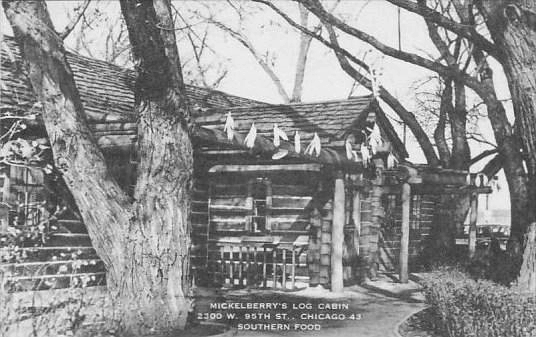





Mystery Blasts Baffle Chicago 46 in the Area in 18 Months
None Has Been Solved.
The New York Times - August 2, 1964.The bombing resulted in extensive damage to the entrance of the restaurant, but it was limited, and the restaurant continued to operate for another 3 years. Mickelberry's Log Cabin restaurant was razed in 1967.
CHICAGO, Saturday, August 1, 1964 — Four bombings this week raised to 46 the number of bomb or arson attacks on Chicago area businesses in the last 18 months. Twenty‐two of the targets has been restaurants. Two restaurants were bombed last weekend, the damage at one estimated at $40,000. The third bombing in a 24-hour period occurred at an automobile plating plant. The fourth bombing in three days was at a trucking terminal.
None of the crimes has been solved, and all of those concerned—the victims and the authorities—profess to have no idea of either the motive or the possible identity of the perpetrators. Law enforcement agents and insurance investigators say they wish they knew.
William J. Cowhey, the Illinois State Fire Marshal, who investigates all such incidents outside of the city, where most of them have occurred, said: “There's just no rhyme or reason for them. I wouldn’t know what the motives are.” He suggested, as possible motives, extortion, insurance, competition, business failure. But he acknowledged that he was only guessing.
Chicago Detective Sergeant Edward Neville, who investigated the recent bombing of Mickelberry's Log Cabin Restaurant on Chicago's Southside, said: “There doesn’t seem to be any motive at all.” He said the manager of the restaurant insisted he had had no trouble with unions, customers, suppliers or competition.
Sgt. Drew Brown, who heads the Chicago police bomb and arson detail, suggested that the bombers “are just picking these places at random.”
Robert May, chief special agent in charge of the Chicago office of the National Board of Fire Underwriters, said he doubted if there was any single motive for the bombings and arson fires.
“We’ve found a few that may be fraud and insurance fires,” he said. “But they were very few. Most of them were not. I have no idea what's behind them.”
While law enforcement investigators reported repeatedly that owners of places bombed or burned could give no reason for the attacks, at least a dozen restaurateurs interviewed by newsmen expressed fear that the wave of restaurant bombings might be the prelude to a campaign of extortion and terrorism by crime syndicate hoodlums.
The owners, who asked that their names and establishments not be identified for fear that “something might happen,” expressed belief the bombings are “a message to get others inline” to pay protection money to syndicate extortionists or to force the sale of products and supplies from hoodlum‐owned purveying firms.
Compiled by Dr. Neil Gale, Ph.D.


Great place to eat. Family had a wedding reception there once in the early '60s. Also had my car broken into in the parking lot about the same time. Thanks, Neil.
ReplyDeleteSadly, I was never there. Don't even remember it.
ReplyDeleteMy parents held their wedding luncheon there in 1940. I don't remember eating there. We rarely ate out as kids, but it was always pointed out as the special place it was whenever we drove by.
ReplyDeleteWorked at Mickelberry's 1966-67. Right before they closed I got a call from Mr. Adler who told me I had a paycheck waiting for me. It was for $4.00, dishwasher pay... 75¢ hr.
ReplyDeleteI use to live very near there and my parents would take me there often. Love the food and atmosphere and missed it after the fire.
ReplyDeleteMy sister worked there. She made homemade Thousand Island dressing and French just like theirs. I still make from scratch. I remember the ham and also blueberry syrup on my pancakes is still my favorite syrup when we go out.
DeleteI have a picture of my grandmother taken in front of this restaurant in June, 1960 that I am happy to share.
ReplyDeleteWhen I was a kid my parents took my sister and me to Mickelberry’s as our First Big Dining-Out Trip. Spent weeks schooling us on how to behave in public. When the day came, as the story goes (I don’t remember it myself), we got there and were seated, whereupon I sneezed and got a horror-stricken look on my face, crying out, “I sneezed at Mickelberry’s!!” Well, *they* all thought it was funny. Me, I was traumatized.
ReplyDeleteI ate there with my family many times in the 1940s and 50s. I loved the antiques and memorabilia and the wooden airplane prop in the front courtyard.
ReplyDeleteI took this girl on the second date for her birthday in 1961.
ReplyDeleteIt was the best date I ever had and I was a lucky man when we got married in the summer of 1966
Loving memories of my wife that Recentlypassed And the wonderful times we had together
Treasure those special moments forever. My sister had her wedding reception there it was lovely
DeleteGrowing up on South Side in the 1960s. Looked forward to our annual visit to Evergreen Plaza for back-to-school items & if budget allowed cross street to Mickelberries! Best memories!
ReplyDeleteHad my wedding breakfast there for bridal party. family and friends. The day before April 21, 1967 there was a tornado that destroyed many things on 95th Street. We had to go through National Guard to get to the restaurant. My mother had to go through police captain first to arrange for us to go through the blocked street. Some memory!
ReplyDeleteI remember that
Delete